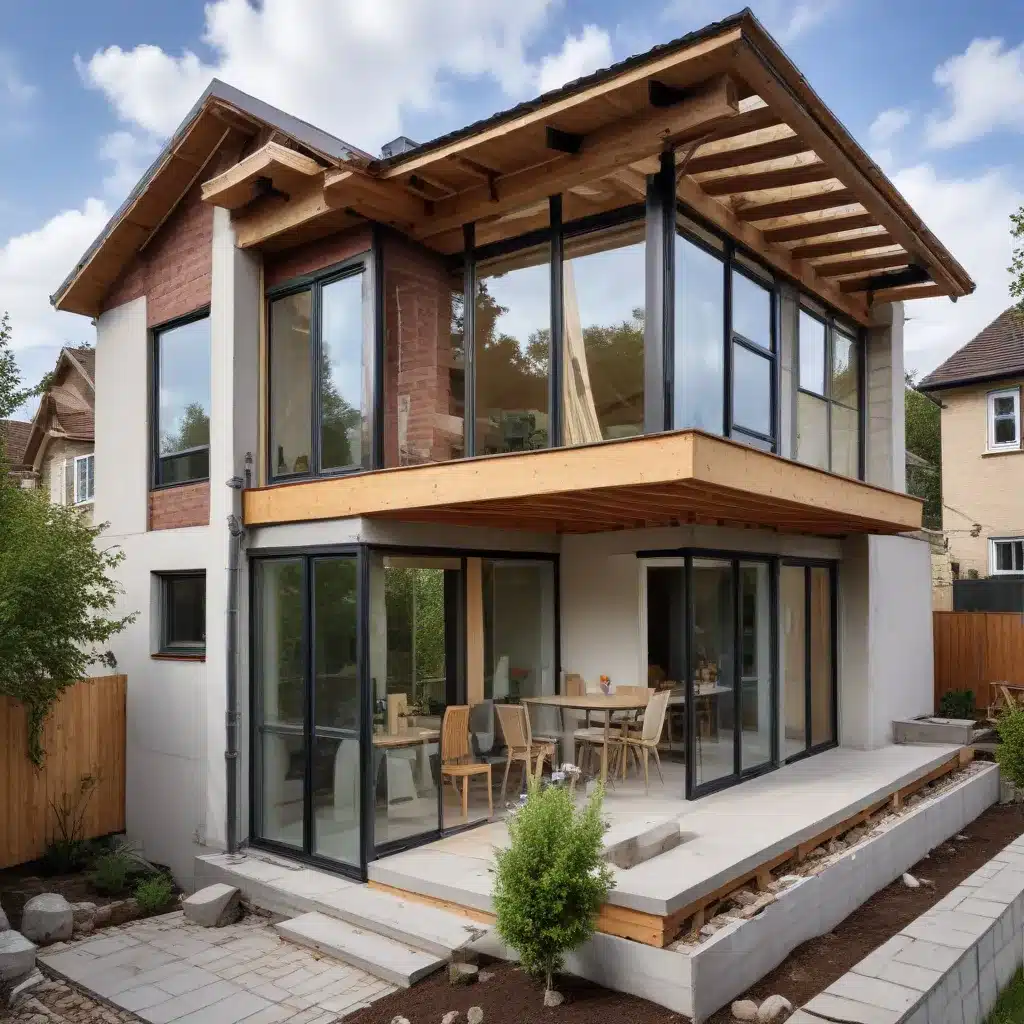
As an experienced home extension consultant, I’ve witnessed the growing demand for sustainable home improvements that not only enhance a property’s functionality, but also minimize its environmental impact. In this comprehensive guide, we’ll delve into the world of sustainable home extensions, exploring cutting-edge strategies and integrated engineering solutions to help you create a more eco-friendly, energy-efficient, and future-proof living space.
Energy Efficiency Strategies
At the heart of any sustainable home extension lies a focus on energy efficiency. By harnessing the principles of passive solar design and incorporating high-performance insulation, you can significantly reduce your energy consumption and carbon footprint.
Passive Solar Design
Passive solar design harnesses the sun’s natural energy to heat and cool your home, reducing the reliance on mechanical systems. This can be achieved through strategic window placement, thoughtful orientation of the building, and the use of thermal mass materials that absorb and release heat. By aligning your home extension with the sun’s path, you can maximize natural lighting and minimize the need for artificial lighting, further enhancing your energy savings.
High-Performance Insulation
Insulation plays a crucial role in maintaining a comfortable indoor temperature, regardless of the outdoor conditions. When planning your home extension, consider incorporating advanced insulation materials, such as structural insulated panels (SIPs) or spray foam insulation. These high-performance solutions can create a highly efficient building envelope, reducing heat transfer and minimizing the energy required for heating and cooling.
Renewable Energy Integration
Complementing your energy efficiency measures, the integration of renewable energy sources can further enhance the sustainability of your home extension. By harnessing the power of the sun and wind, you can generate clean, renewable electricity to power your home, reducing your reliance on the grid and your carbon footprint.
Solar Photovoltaic Systems
Solar photovoltaic (PV) panels are a popular choice for home extensions, as they can be seamlessly integrated into the roof or building facade. These systems convert sunlight into electrical energy, which can be used to power your home or even fed back into the grid, generating revenue through feed-in tariffs or net metering schemes.
Wind Power Generators
While not as common in residential settings, small-scale wind turbines can be a viable option for some home extensions, particularly in areas with consistent wind patterns. These compact generators can provide a supplementary source of renewable energy, further reducing your reliance on traditional grid-supplied electricity.
Sustainable Building Materials
The materials used in your home extension can have a significant impact on its environmental performance. By prioritizing natural and recycled materials, you can reduce the embodied carbon associated with your project and contribute to a more circular economy.
Natural and Recycled Materials
Sustainable building materials, such as bamboo and reclaimed wood, offer a range of benefits. Bamboo, for example, is a fast-growing and highly renewable resource that can be used for flooring, cabinetry, and even structural elements. Reclaimed wood, on the other hand, gives new life to discarded timber, reducing the demand for virgin resources and minimizing waste.
Embodied Carbon Reduction
Alongside the use of sustainable materials, it’s essential to consider the embodied carbon associated with your home extension. Embodied carbon refers to the greenhouse gas emissions generated during the production, transportation, and installation of building materials. By conducting a lifecycle assessment (LCA) and prioritizing materials with a lower carbon footprint, you can significantly reduce the overall environmental impact of your project.
Integrated Building Systems
Achieving true sustainability in a home extension requires a holistic approach that integrates various building systems, optimizing their performance and synergy.
Optimized HVAC Solutions
Heating, ventilation, and air conditioning (HVAC) systems are a significant energy consumer in any home. When planning your home extension, consider incorporating high-efficiency solutions, such as geothermal heat pumps or radiant heating and cooling systems. These technologies can drastically reduce your energy usage while maintaining a comfortable indoor environment.
Smart Home Automation
The integration of smart home automation can further enhance the sustainability of your home extension. By installing energy management systems, occupancy sensors, and smart appliances, you can optimize energy consumption, automate lighting and climate control, and ensure that your home is operating at peak efficiency, even when you’re not there.
Sustainable Site Design
The integration of sustainable site design principles can complement the energy-efficient and renewable-powered features of your home extension, creating a harmonious and eco-friendly living environment.
Stormwater Management
Effective stormwater management is crucial for minimizing the environmental impact of your home extension. Consider incorporating permeable paving solutions, such as porous concrete or interlocking pavers, which allow rainwater to infiltrate the ground, reducing runoff and reducing the strain on local drainage systems. Bioswales, or shallow vegetated channels, can also be strategically placed to capture and filter stormwater, promoting groundwater recharge and reducing the risk of flooding.
Landscape Integration
The integration of your home extension with the surrounding landscape can further enhance its sustainability. By incorporating native plant species and drought-tolerant landscaping (known as xeriscaping), you can reduce the need for irrigation, conserve water, and create a harmonious blend between the built and natural environments.
As you embark on your sustainable home extension project, remember that the key to success lies in a holistic, integrated approach that considers energy efficiency, renewable energy integration, sustainable materials, and site-specific design elements. By working with experienced professionals and embracing the latest advancements in sustainable building integrated engineering, you can create a home extension that not only meets your needs but also sets a new standard for eco-friendly living.
For more information on our sustainable home extension services, please visit https://abc-home.co.uk/home-extension/. Our team of experts is here to guide you through every step of the process, ensuring that your project is not only visually stunning but also environmentally responsible.
















